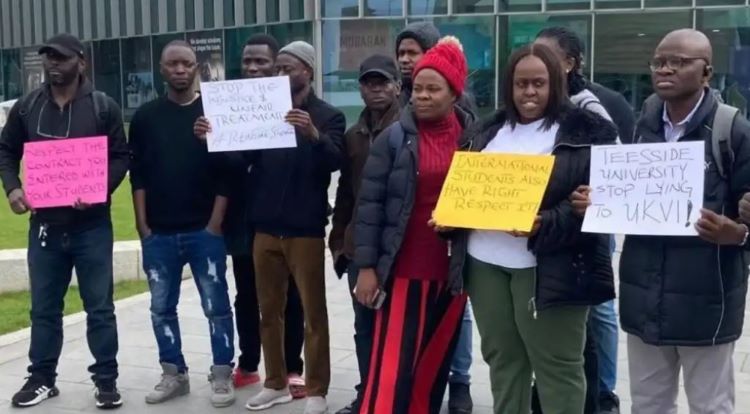The Federal Government has announced that Teesside University in the United Kingdom has implemented a more compassionate payment method for Nigerians schooling in its institution.
The Chairman, Nigerians in Diaspora Commission, Abike Dabiri-Erewa stated this on Thursday at a press conference ahead of the National Diaspora Day Celebrations 2024 on July 25, in Abuja.
The financial crisis in Nigeria, exacerbated by a shift from a seven-installment to a three-installment payment plan by the university, left many students struggling to cover their expenses.
On May 22, 2024, a group of Nigerian students at Teesside University were ordered to leave the United Kingdom due to difficulties in paying their tuition fees on time.
Mohbad’s father appeals for Nigerians’ help in unraveling cause of son’s death0.00 / 0.00
The students cited the devaluation of the naira as a significant barrier to meeting their financial obligations, which has led to a breach of their visa sponsorship requirements.
Several students found themselves locked out of their university accounts, reported to the Home Office, and mandated to leave the UK. The university maintained that strict external regulations necessitate these actions.
The affected students, numbering 60, expressed deep distress and disappointment, accusing the university of being unsupportive and “heartless.”
They banded together to urge the university for assistance after witnessing their peers face severe consequences for late payments.
On May 29, 2024, the Federal Government stepped in to address the deportation orders issued against some Nigerian students at Teesside University.
A delegation led by a representative of the Nigerian Embassy in the UK, Amb. Christian Okeke, along with leaders of the Nigerian Students Union in the UK, met with the university’s management to seek a resolution.
Giving updates on intervention outcome, Dabiri-Erewa noted that while the students were still required to pay their fees, the new arrangements aimed to make the process more manageable.
For those students who were near completion of their payments and were asked to leave, Dabiri-Erewa stated that an agreement had been reached allowing them to finish their payments and receive their certificates once all fees are settled.
“The Teesside University has come up with a more compassionate payment method. The students are going to pay their fees. It is not charity, but they have devised ways that can be a bit more convenient.
“For those who were almost done with payment and were told to leave, they agreed that they would pay their fees but would not receive their certificate until they complete their payment,” she explained.
The NiDCOM boss also mentioned that Teesside University was not the only institution affected, saying many other universities have Nigerian students facing similar issues.
“We are working closely with the student organisations in the UK and the Nigerian Mission to address these challenges,” she added.
The NiDCOM boss highlighted economic instability, security concerns, and inadequate living standards as the primary drivers behind the increasing migration of Nigerians abroad.
She noted that the theme for this year’s National Diaspora Day, “Japa Phenomena and its Implications for National Development,” reflected growing concerns over the demographic most affected by this migration—Nigeria’s youth.
“Factors such as economic instability, security concerns, and inadequate standard of living are ranked high among reasons for the exodus of Nigerians abroad.
“The consequence of this phenomenon is the decline of strong human resources because most of the Nigerians relocating are the youths,” Dabiri-Erewa noted. “This in turn, makes a downward turn on labour and productivity in the country.”
Despite these challenges, Dabiri-Erewa called for a change in perspective, urging Nigerians to see the positive side of the situation.










